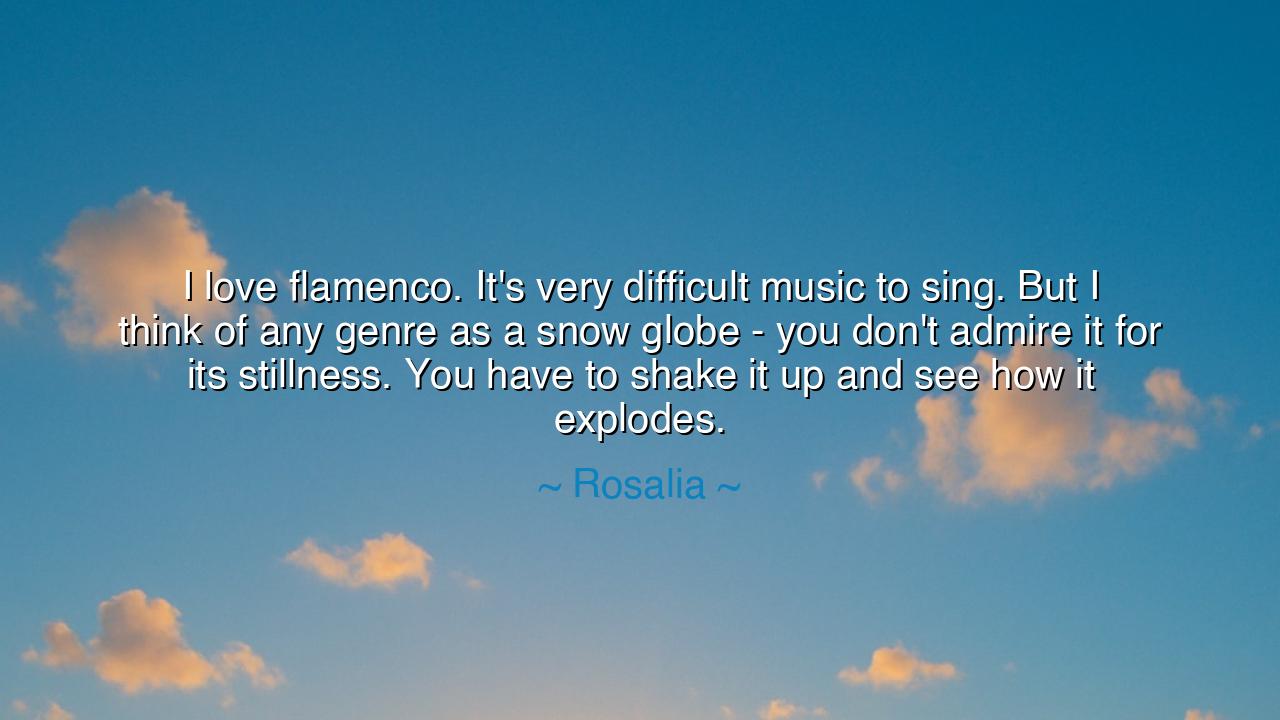
I love flamenco. It's very difficult music to sing. But I think
I love flamenco. It's very difficult music to sing. But I think of any genre as a snow globe - you don't admire it for its stillness. You have to shake it up and see how it explodes.






Rosalía, the songstress who bridges past and future, once said: “I love flamenco. It’s very difficult music to sing. But I think of any genre as a snow globe—you don’t admire it for its stillness. You have to shake it up and see how it explodes.” In these words is a vision that is both ancient and revolutionary. She honors tradition while proclaiming the eternal law of art: that beauty is not found in silence or stagnation, but in transformation. The snow globe, admired only when stirred, becomes her symbol of music itself—meant not to remain untouched, but to be awakened into brilliance through risk and renewal.
The ancients too knew this truth. The Greeks spoke of the Muses as living forces, never still, always inspiring movement and change. The river that nourishes does not remain frozen; it flows, it overflows, it carves valleys through stone. So too with music—it must be shaken if it is to reveal its depth. Tradition is a sacred vessel, yes, but if kept untouched, it becomes a relic. Only when stirred by living hands, like the snow globe in Rosalía’s words, does it erupt with wonder, reminding us that the true spirit of music is alive, not embalmed.
Flamenco, born of the Romani, Moorish, Jewish, and Andalusian traditions of Spain, is itself the child of struggle and renewal. It is a music of deep lament and fierce joy, woven from centuries of cultural exchange and hardship. To sing it is to step into a river of fire and sorrow, demanding both discipline and abandon. Rosalía honors this difficulty, yet dares also to shake it up, blending flamenco with hip-hop, reggaetón, and electronic textures. In doing so, she reveals its universal soul, showing that the tradition is not weakened by change but set ablaze by it.
Consider the story of Pablo Picasso, who revered the Spanish masters of painting yet shattered the stillness of their tradition with Cubism. He took what was revered, shook it like a globe, and out of the fragments built something explosive, something new. Many cried that he had destroyed beauty, but history has proven otherwise: he reawakened it. Just as Picasso reinvented Spanish art, so Rosalía dares to reinvent Spanish song, proving that reverence and revolution need not be enemies, but companions.
The meaning of her words is this: art cannot remain still. To preserve it without change is to entomb it. Every genre, like every snow globe, waits to be stirred, to scatter its hidden light into a thousand dancing fragments. And the artist, with courage and vision, must be the one to shake it. For though the world may resist, though tradition may cry out, the explosion is not destruction but rebirth.
The lesson for us all is clear: in life, as in music, do not admire the stillness too long. Do not keep your gifts locked away in glass. Shake up your routines, your ideas, your habits. Stir the waters of your own creativity, and watch as the snow of possibility explodes into new patterns. For it is only in motion that life reveals its brilliance.
Therefore, let each soul honor the traditions that shaped them, but not fear to transform them. Learn deeply from the roots of your craft, but do not be bound by them. Add your own voice, your own vision, your own explosion of color and sound. For in doing so, you join the eternal lineage of creators who refused stillness and chose instead the fire of renewal.
Thus Rosalía’s words endure: flamenco is sacred, but so too is the act of transformation. Every genre is a snow globe; to leave it still is to leave it unseen. But to shake it up, to let it explode, is to honor its true life. And so it is with art, with love, with life itself: only in movement, only in daring, do we find the fullness of beauty.






AAdministratorAdministrator
Welcome, honored guests. Please leave a comment, we will respond soon